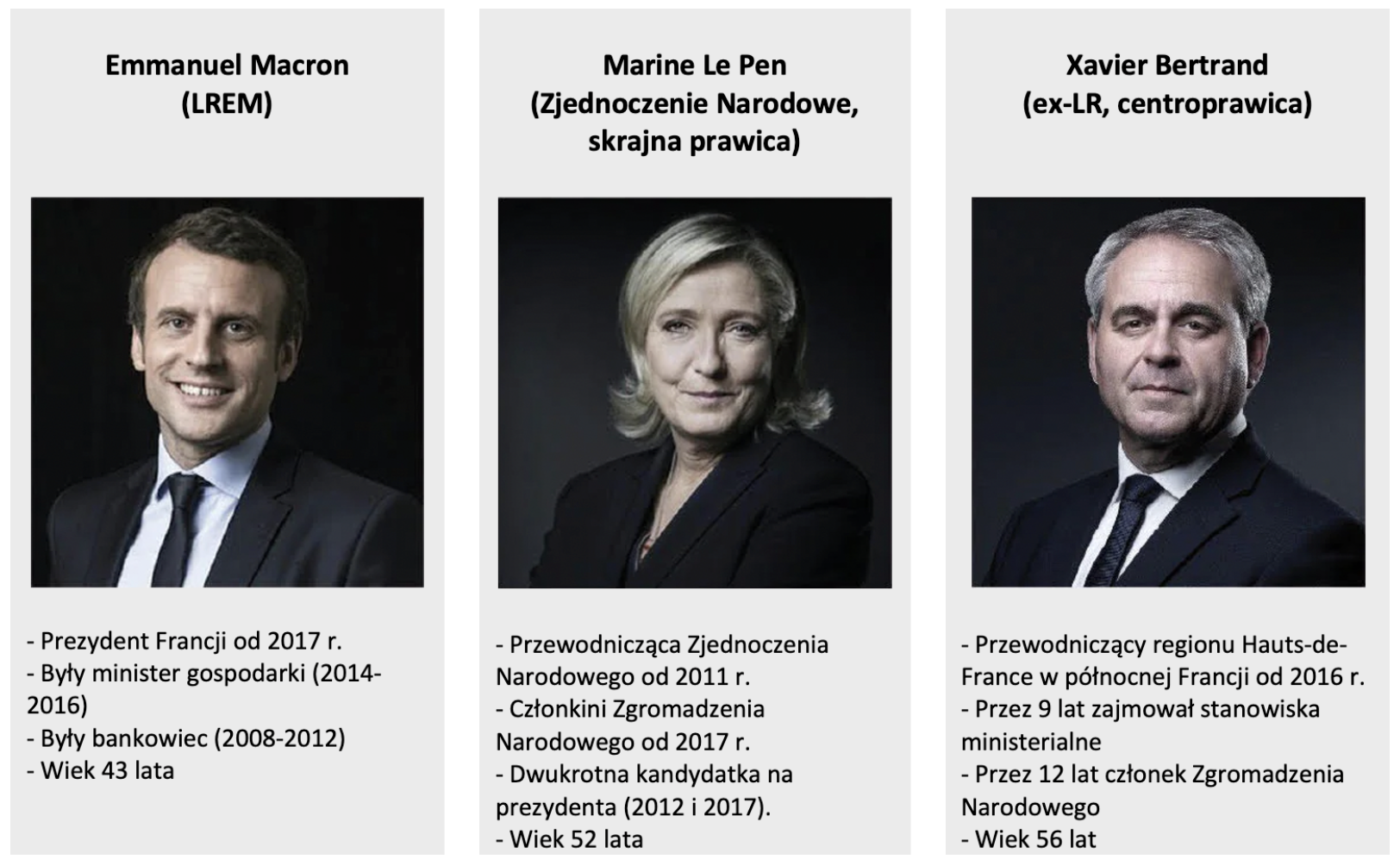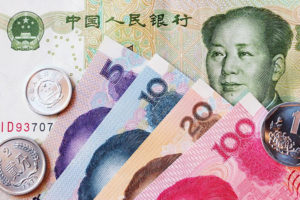Introduction to the presidential elections in France
The French presidential campaign of 2022 will not realistically start until September. However, all the declared and expected candidates have already started to convince voters. The regional elections in June 2021 turned out to be a defeat for both the party of President Emmanuel Macron - Republika Forward (fr. The Republic in motion, LREM) and the extreme right-wing National Union (fr. National Gathering) Marine Le Pen. The result was also influenced by the record number of people abstaining (66,7% in the first round and 65,7% in the second round). Neither party managed to win in any of the thirteen regions of France. This came as no surprise to LREM, as the party had significant problems gaining support in rural areas. However, this was a surprise for the National Unification, as most of the polls gave him victory in at least one or two regions. French regional elections are usually not indicative of the outcome of presidential elections. Despite the defeat of Macron and Le Pen, they are still seen as leaders of the April 2022 elections.
About the Author
 Christopher Dembik - French economist of Polish origin. Is a global head of macroeconomic research at a Danish investment bank Saxo Bank (a subsidiary of the Chinese company Geely serving 860 HNW customers around the world). He is also an advisor to French parliamentarians and a member of the Polish think tank CASE, which took first place in the economic think tank in Central and Eastern Europe according to a report Global Go to Think Tank Index. As a global head of macroeconomic research, he supports branches, providing analysis of global monetary policy and macroeconomic developments to institutional and HNW clients in Europe and MENA. He is a regular commentator in international media (CNBC, Reuters, FT, BFM TV, France 2, etc.) and a speaker at international events (COP22, MENA Investment Congress, Paris Global Conference, etc.).
Christopher Dembik - French economist of Polish origin. Is a global head of macroeconomic research at a Danish investment bank Saxo Bank (a subsidiary of the Chinese company Geely serving 860 HNW customers around the world). He is also an advisor to French parliamentarians and a member of the Polish think tank CASE, which took first place in the economic think tank in Central and Eastern Europe according to a report Global Go to Think Tank Index. As a global head of macroeconomic research, he supports branches, providing analysis of global monetary policy and macroeconomic developments to institutional and HNW clients in Europe and MENA. He is a regular commentator in international media (CNBC, Reuters, FT, BFM TV, France 2, etc.) and a speaker at international events (COP22, MENA Investment Congress, Paris Global Conference, etc.).
Let's meet the next president of France
In our opinion, there is a 70% chance that President Emmanuel Macron will be re-elected for a second five-year term in April 2022 after another victory over Marine Le Pen. If the recovery of the French economy continues in 2022, fueled by cumulative demand and household savings surpluses, Macron will find itself in a very favorable macroeconomic environment. This is our baseline scenario. Macron will work to ensure that the recovery does not lose momentum by pushing up next year's ministerial spending to a new record EUR 11bn, compared with EUR 3bn ahead of the 2017 presidential election. to be in a better position than Macron.
There are already a dozen or so declared candidates, and in the coming months there will be a dozen more. However, few of them will make a place on the list in the first round. Candidates must be supported by at least 500 representatives of national or local authorities from at least 30 different overseas departments or communities, with a maximum of one in ten signatories from one department. This system automatically favors candidates from the largest parties that have many members in parliament and local government. On the other hand, it makes it difficult to win the support of candidates such as Hélène Thouy from the Animal Defenders Party (fr. Animalistic party), the aim of which is to draw attention to the fate of animals during the campaign. This grouping can count on little support from the authorities. On the election day, 8-10 candidates should be on the list.
In our opinion, the only candidate that could seriously threaten Macron and Le Pen is former Sarkozy minister Xavier Bertrand. Bertrand is a former member of the center-right Republican party (fr. The Republicans, LR). He is currently the president of the council for the Hauts-de-France region in northern France. Bertrand is by no means a new face in politics. He held the office of minister for 9 years and sat in the National Assembly for 12 years. Until recently, however, he was relatively unknown to the general public. In the June regional elections, he defeated the candidates from the far right and the ruling LREM party, gaining 52% of the vote. At the moment, it is in the best position among the potential right-wing candidates for the first round of the presidential election.
Unless there is an unexpected turn in favor of the left, the socialists, the Greens and the extreme left party of Jean Luc Mélenhon France France Insoumise) will not play a significant role in this campaign. They will not go through to the second round.
The message from the polls
2017 replay
According to an Elabe poll published after the June 27 regional elections, Macron and Le Pen remain at the forefront of the presidential race with 29% and 25% respectively. Bertrand is far behind with 14% support. This confirms our opinion that in 2022 the second round will most likely take place between Macron and Le Pen. Recent polls indicate that Le Pen would lose to Macron as well as to any potential center-right candidate (including Bertrand). Le Pen is in the electoral 'no man's land' - he is able to get around 20% of the votes to go to the second round, but not the 50% needed to win the presidential election. According to some, but not all, polls, the only scenario under which Le Pen could become the next president of France is that she would face a center-left or far-right candidate in the second round. In our opinion, the probability of such a scenario is almost zero.
"The third one"
Bertrand is now considered the "third" candidate. However, he still has a long and uncertain road ahead. We see three significant handicaps that would prevent him from progressing to the second round: 1) lack of working-class support, 2) problems with fundraising, and 3) lack of charisma.
1) Bertrand is no longer officially a member of LR. However, it enjoys strong support from center-right voters (over 70% according to the latest polls). On the other hand, support from the working class is practically negligible (around 10%). In the coming months, Bertrand will try to convince disgruntled center-left voters. However, this direction is not without risk. Bertrand could thus lose the support of the conservatives who voted in 2017 for the socially liberal and fiscal conservative LR candidate François Fillon.
2) Bertrand finds it difficult to raise funds to finance campaigns from individuals (donations from businesses are prohibited in France). However, this is just the beginning of the campaign. If it manages to maintain its position in the polls, funds for the campaign will increase.
3) In our opinion, the main weakness of Bertrand is his "boomer lack of charisma". Charisma is a trait that cannot be developed, learned, or trained, unlike other skills. In this respect, Bertrand is unable to compete either with Macron's brilliance, charm and physical attractiveness, or with Le Pen's confidence, energy and determination.
The emergence of the populist outsider
Until April 2022, a lot could still happen, including a populist outsider candidate, as was the case in the 1981 presidential election, when famous comedy actor Coluche won 15% of the vote before finally dropping out from the race for the presidential chair. Among the potential populist outsiders, names such as Eric Zemmour, a xenophobic journalist with several convictions for inciting hatred, and Jean Marie Bigard, a well-known comedy actor supporting the Yellow Vest movement, are most often mentioned. However, unless the economic situation deteriorates sharply by the time of the first round of elections, we do not believe that such a risk is significant.
At this point, in the absence of a serious rival who would be able to shuffle all the cards in the race for the president, it seems that the final duel will be played for the second time between Macron and Le Pen. Polls show that a large part of the French left would abstain in such a situation. We don't think that would be enough for Le Pen to win. However, this race will be much more even than in 2017.
Lead Candidate Programs
Macron: "Republican Patriotism", Social Solidarity and a Low Carbon Economy
Macron is aware that he needs an image change in order to be elected for a second term in 2022. After significant progress in 2017-2019, the pace of reforms has slowed. Due to the pandemic, Macron had to put his flagship pension reform on hold. Currently looking for a new injection of energy, promoting a new political formula combining the so-called "Republican patriotism", social solidarity and low-carbon economic recovery. This should appeal to the different groups of voters he needs to hold his seat for a second term: center-left and center-right ecologically minded. However, it is not clear which reforms he will want to implement. He will most likely reveal the highlights of his agenda at the last minute, as is the custom of French presidents seeking re-election.
Le Pen: total volt on the euro
Three months after the presidential election in 2017, Le Pen abandoned the controversial project to exit the eurozone, which cost her votes after the final debate with Macron. Le Pen has also recently softened her criticism of the European Union. It no longer insists on the dissolution of the Schengen Agreement on open borders, and even defends the free movement of people within the EU - but on condition that it is limited to EU citizens, which would probably be unenforceable. All of this is intended to transform the National Reunification from an eternal outsider into a less toxic participant in the French political arena. However, further steps are needed to win the presidential election. The more support Le Pen receives in the polls, the more closely her competences will be analyzed. This is her weak point. It lacks basic economic knowledge and has so far failed to attract talent to develop a sensible and pragmatic economic program. Le Pen projects are often economically unrealistic and too vague. It aims to lower the official retirement age, currently 62 and one of the lowest in OECD countries, to 60. According to our estimates, if this plan were to be implemented, the deficit of the French pension system would almost double to EUR 2025 billion by 37. In the long term, this would pose a serious threat to the benefits of future retirees. Le Pen also wants to increase public spending on investments to invest in new technologies. However, it is not clear how these expenses would be financed.
Due to the fact that Le Pen abandoned the controversial Frexit referendum project in the event of a victory in the presidential election, we believe that next year the bond market risk related to elections in France will only slightly increase compared to 2017. We predict that by the elections in 2022 the difference between the yields on French and German government bonds will increase by 30-35 basis points. However, it will be far from the levels recorded in 2017 (around 80 basis points).
Bertrand: Governments are partly via a referendum
Bertrand undertakes to exercise power in part through a referendum, thus responding to one of the Yellow Vests demands. It is a popular concept among French politicians during the campaign. However, shortly after winning, they often deviate from this idea. A referendum is apparently the greatest tool of democracy. In practice, citizens tend to see a referendum as voting for the government rather than on the issue under debate. The result is often determined by the popularity of the incumbent president, such as the vote against the European constitution in 2005. After a possible victory, Bertrand will certainly not live up to his promise.
As we are still in the early stages of the campaign, Bertrand has yet to disclose his entire agenda. The main assumption of his economic platform is to further reduce taxes on production. As part of the French recovery plan developed in September 2020, the French government will cut taxes on production by EUR 2021 billion each year between 2022 and 10. Bertrand wants to go even further and cut them in half (~ EUR 33 billion per year). According to our estimates, this would improve the profitability of companies and reduce the competitiveness gap between France and Germany in terms of production taxes by two-thirds.
The disease of French democracy
Our baseline scenario assumes the re-election of Macron. As in 2017, in the first round, voters with better wages and education will vote for Macron, while the lower-earning and educated electorate will vote for Le Pen. In the second round, the campaign against Le Pen will see Macron re-elected for a second term ending in 2027. However, his mandate may be questioned. Macron is sure to face strong resistance to the planned reforms. This was proven by the protests of the Yellow Vests in 2017, the mass strikes against the pension reform in 2019 and the anti-vaccination movements in 2021. we do not see Macron's anticipated victory as a triumph of reformism, but rather as a symbol of a serious crisis in French democracy. This would be the fourth time in the last twenty years that the French would vote against, not for a specific candidate in presidential elections (Chirac-Le Pen in 2002, Sarkozy-Hollande in 2012, Macron-Le Pen in 2017) .






















![Forex Club – Tax 9 – Settle tax on a foreign broker [Download the Application] Forex Club - Tax 9](https://forexclub.pl/wp-content/uploads/2024/02/Forex-Club-Podatek-9-184x120.jpg?v=1709046278)
![Trading View platform – solutions tailored to the needs of traders [Review] trading view review](https://forexclub.pl/wp-content/uploads/2024/03/trading-view-recenzja-184x120.jpg?v=1709558918)
![How to connect your FP Markets account to the Trading View platform [Guide] fp markets trading view](https://forexclub.pl/wp-content/uploads/2024/02/fp-markets-trading-view-184x120.jpg?v=1708677291)
![How to invest in ChatGPT and AI? Stocks and ETFs [Guide] how to invest in chatgpt and artificial intelligence](https://forexclub.pl/wp-content/uploads/2023/02/jak-inwestowac-w-chatgpt-i-sztuczna-inteligencje-184x120.jpg?v=1676364263)


![WeWork – the anatomy of the collapse of a company valued at $47 billion [WeWork, part II] wework bankruptcy story](https://forexclub.pl/wp-content/uploads/2024/04/wework-bankructwo-historia-184x120.jpg?v=1711729561)
![Adam Neumann – the man who screwed up Softbank [WeWork, part AND] adam neumann wework](https://forexclub.pl/wp-content/uploads/2024/04/adam-neumann-wework-184x120.jpg?v=1711728724)





![How to transfer shares to another brokerage office [Procedure description] how to transfer shares to another brokerage house](https://forexclub.pl/wp-content/uploads/2024/03/jak-przeniesc-akcje-do-innego-biura-maklerskiego-184x120.jpg?v=1709556924)

![The most common mistakes of a beginner trader - Mr Yogi [VIDEO] Scalping - The most common mistakes of a beginner trader - VIDEO](https://forexclub.pl/wp-content/uploads/2024/03/Scalping-Najczestsze-bledy-poczatkujacego-tradera-VIDEO-184x120.jpg?v=1711601376)
![Learning patience: No position is also a position - Mr Yogi [VIDEO] Scalping - Learning patience - No position is also a position - VIDEO](https://forexclub.pl/wp-content/uploads/2024/03/Scalping-Nauka-cierpliwosci-Brak-pozycji-to-tez-pozycja-VIDEO-184x120.jpg?v=1710999249)
![When to exit a position and how to minimize losses - Mr Yogi [VIDEO] Scalping - When to exit a position and how to minimize losses - VIDEO](https://forexclub.pl/wp-content/uploads/2024/03/Scalping-Kiedy-wyjsc-z-pozycji-i-jak-minimalizowac-straty-VIDEO-184x120.jpg?v=1710336731)


















